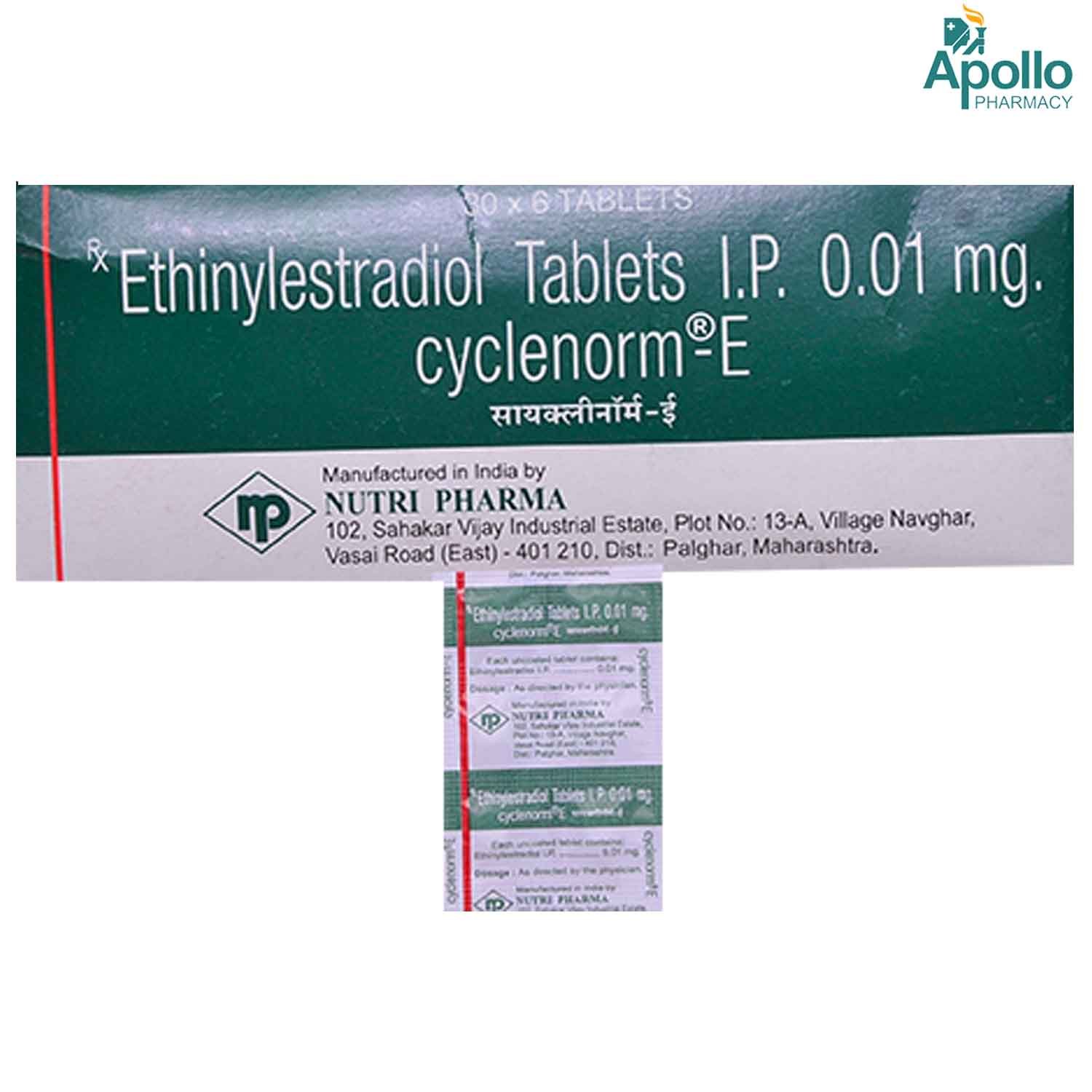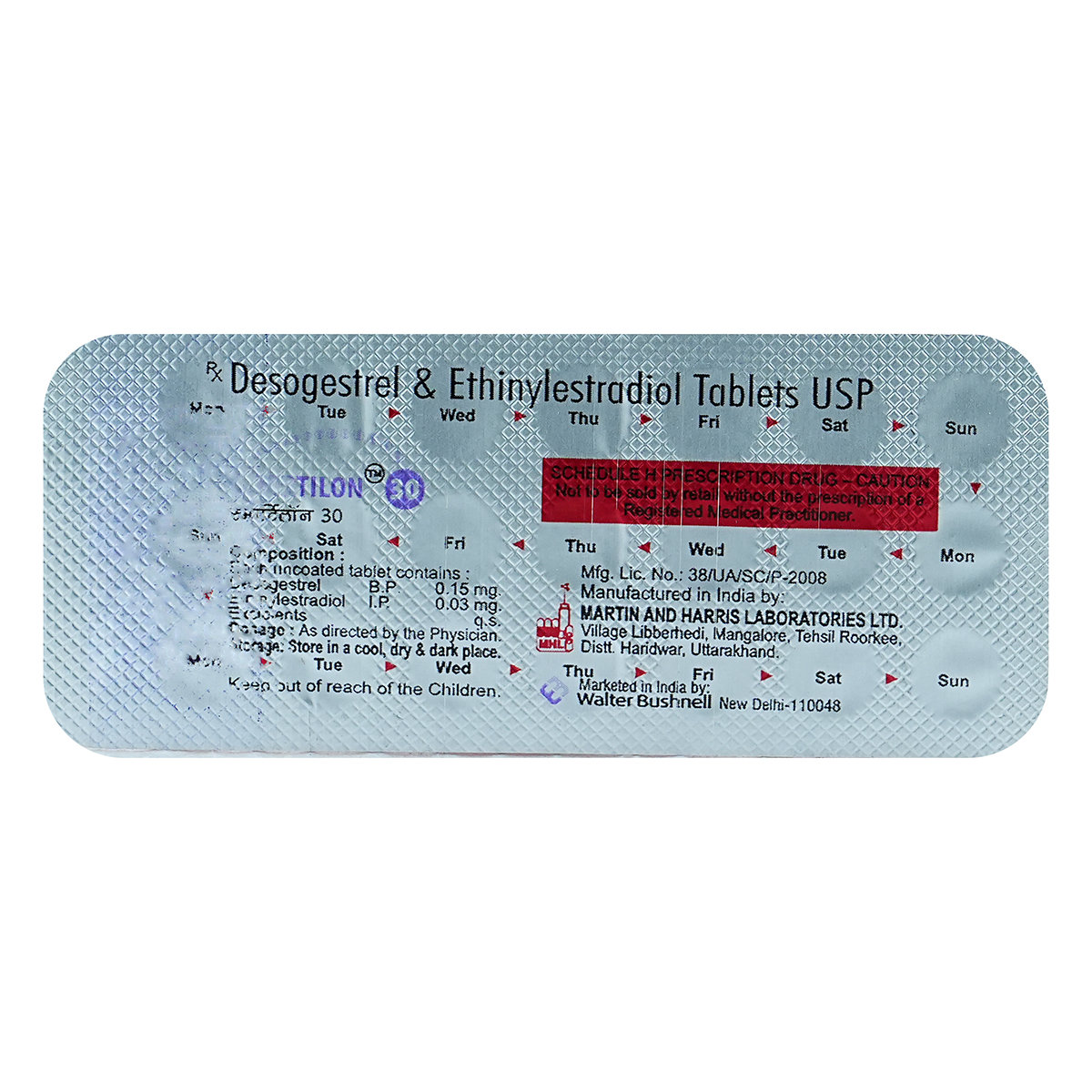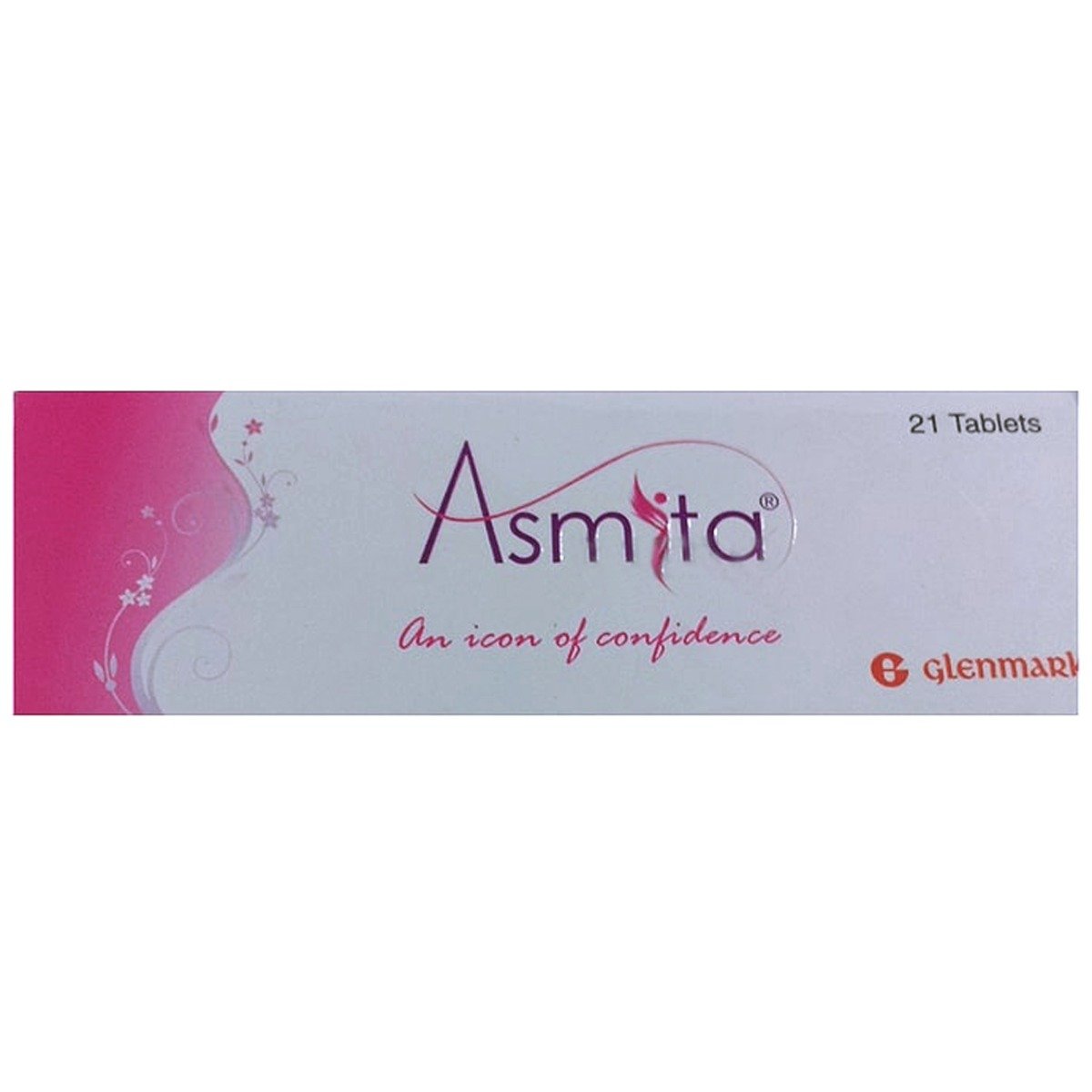Ethinylestradiol
About Ethinylestradiol
Ethinylestradiol is a semi-synthetic female sex hormone which is used as hormonal replacement therapy. It is used in treating hypoestrogenism (estrogen deficiency) and symptoms associated with menopause (itching, dryness in the vagina, hot flushes). In addition to this, it also helps in preventing osteoporosis (thinning of bones), making it less fragile in women post-menopause.
Ethinylestradiol contains ethinylestradiol, an artificial (semi-synthetic) female sex hormone. It regulates the menstrual cycle and ovulation. Ethinylestradiol is given when the body is not making a sufficient amount of natural estrogen. Ethinylestradiol works by replacing the normal hormone estrogen functions in the body and treating symptoms associated with menopause.
Ethinylestradiol should be taken as prescribed by your doctor. It can be taken with or without food. Always take it at the same time every day for the best results. The dose of the medicine will be decided by your doctor, depending on your medical condition. Ethinylestradiol may cause certain side effects such as nausea, vomiting, breast pain, hair loss, vaginal spotting, dry eyes and irregular vaginal bleeding. Most of these side effects do not require medical attention and gradually resolve over time. However, if the side effects are persistent, reach out to your doctor. Do not use Ethinylestradiol if you are pregnant or have recently delivered a baby.
Before starting Ethinylestradiol, inform your doctor if you have been taking any other medicines as hormone replacement therapy. Also, let your doctor know if you have a heart condition or have had a stroke, have any unexplained vaginal bleeding, have had breast cancer, have ever had depression or if you are pregnant or if you are breastfeeding. Ethinylestradiol is not recommended for use in children below 12 years of age unless recommended by your physician.
Uses of Ethinylestradiol
Medicinal Benefits
Ethinylestradiol contains a synthetic female hormone that regulates ovulation and menstruation in women. Ethinylestradiol is given as a hormone replacement therapy for estrogen. It is also used to relieve symptoms of menopause, such as mood swings, reduced sex drive, hot flushes, night sweats and vaginal dryness. Ethinylestradiol is also used in treating prostate and breast cancer and other anticancer medicines. Usually, in most cases, Ethinylestradiol is prescribed along with another female hormone called progestogen.
Directions for Use
Storage
Side Effects of Ethinylestradiol
- Headache
- Breast pain
- Hair loss
- Nausea
- Vomiting
- Vaginal spotting
- Irregular vaginal bleeding
Drug Warnings
If you have or have had heart disease, hypertension, obesity, cancer of the breast, cervix, or uterus, diabetes mellitus, liver disease, renal disease, or abnormal uterine growth, please let your doctor know before taking Ethinylestradiol. Every month, check your breasts for any changes; if you feel lumps or notice anything strange, let your doctor know. When taking Ethinylestradiol, smoking increases the risk of cardiovascular disease in women over 35. No sexually transmitted illnesses, including HIV, are shielded by Ethinylestradiol. Without first consulting, your doctor never begins taking a new drug. You could occasionally have spotting or bleeding in between missing periods or menstrual cycles. Please see a doctor if the spotting doesn't stop. If you are expecting a baby or have just given birth, avoid using Ethinylestradiol. If you are currently nursing or pregnant, avoid taking medication. Please let your doctor know if you suffer from migraines since taking Ethinylestradiol can make them worse. If you get abrupt chest discomfort, limb pain, oedema, or jaundice, stop taking Ethinylestradiol and let your doctor know.
Drug Interactions
Drug-Drug interactions: Ethinylestradiol may interact with anticonvulsants (phenytoin, primidone, ethosuximide, phenobarbital and carbamazepine), azole antifungals (fluconazole), antibiotics like rifampin (rifampicin), contraceptives (gestodene, desogestrel and etonogestrel). Inform your doctor about all your ongoing medications before taking Ethinylestradiol.
Drug-Food Interactions: Avoid alcohol and tobacco use with Ethinylestradiol as it may increase the risk of side effects.
Drug-Disease Interactions: Inform your doctor if you have heart disease, breast cancer, depression, hyperprolactinemia (high levels of prolactin in the blood), jaundice, diabetes, or unexplained vaginal bleeding.
Drug-Drug Interactions Checker List:
Safety Advice

Alcohol
unsafeYou are recommended not to consume alcohol along with Ethinylestradiol to avoid unpleasant side effects.

Pregnancy
unsafeEthinylestradiol should not be taken during pregnancy as it may harm the baby and cause serious complications to the baby and mother. Consult your doctor for further advice.

Breast Feeding
unsafeEthinylestradiol is not recommended for breastfeeding mothers as it is known to cause harm to the baby. Consult your doctor for further advice.

Driving
safe if prescribedEthinylestradiol does not impact your ability to drive or use machinery.

Liver
cautionEthinylestradiol should be taken with caution, especially if you have any history of liver disease. Your doctor may adjust the dose of this medicine or prescribe a suitable alternative based on your condition.

Kidney
cautionEthinylestradiol should be taken with caution, especially if you have a history of kidney disease. Your doctor may adjust the dose of this medicine or prescribe a suitable alternative based on your condition.

Children
cautionEthinylestradiol is not recommended for children below 12 years of age as safety and efficacy are not established. Consult a child specialist for further advice.
Habit Forming
Diet & Lifestyle Advise
- Keep your weight under control with a body mass index (BMI) of 19.5-24.9.
- Opt for a diet rich in whole grains, fruits, veggies and low-fat dairy products.
- Try to include heart-healthy omega-3 fatty acid-containing food drinks in your daily diet.
- Avoid chronic stress and physical exercise like running, as it might increase vaginal bleeding.
- Monitor your blood sugar level and blood pressure regularly to avoid any complications.
- Quitting smoking and not drinking alcohol is the best strategy to lower the risk of any complications.
- Do regular exercise and physical activity to minimize hot flushes and improve sleep. Besides this, weight-bearing exercises can help in making your bones strong. Aerobics, yoga and activities like tai chi may help in relaxing the body and mind.
- Try to wear loose clothes before going to bed and sleep in a cool, well-ventilated room. Doing this can prevent symptoms of hot flushes and night sweats. Take a minimum sleep of 8 hours.
- Avoid or limit intake of caffeine-containing beverages, alcohol and spicy food, as these are known triggering agents for hot flushes.
Special Advise
Stop taking this Ethinylestradiol and inform your doctor immediately if you notice unexplained pain and swelling in your limbs, chest pain, shortness of breath, severe headache or vision changes. These could be symptoms of a blood clot in a vein.
Patients Concern
Disease/Condition Glossary
Hypoestrogenism: It refers to the lowered secretion of the natural female sex hormone known as estrogen. It is an umbrella term that is used for estrogen deficiency in various conditions. Its abnormalities may lead to infertility, bone loss, and lipid abnormalities.
Osteoporosis: Osteoporosis means the bone has become porous. It is a disease in which too much bone is lost in the body, and the body makes relatively little bone. As a result, bones become weak and can break easily if you fall.
Hormone replacement therapy (HRT): It is a treatment to relieve symptoms of menopause. It replaces hormones that are at a lower level as you approach menopause.
Dysmenorrhea: It is an irregular and painful period leading to abdominal pain, digestion problems, fainting, vomiting, and nausea. Generally, a menstrual cycle is about 25-30 days. But this cycle may be short or prolonged in dysmenorrhea, leading to excessive pain.
Menopause: Menopause occurs when a woman between 45 and 55 has not had a period for 12 months or more. However, some women may also experience menopause before 45 years or after 55 years. It occurs due to decreased production of estrogen hormone. The change in levels of other hormones such as progesterone, luteinizing hormone and the follicle-stimulating hormone is also observed during menopause. It causes symptoms such as hot flushes, vaginal dryness, insomnia (sleeplessness), weight gain, reduced sexual desire, sore breasts, hair loss, unwanted hair growth, headache and urinary tract infections.
FAQs
Ethinylestradiol is given when the body is not producing a sufficient amount of natural estrogen. Ethinylestradiol is given as a hormone replacement therapy. It works by replacing the normal hormone estrogen functions in the body and treating symptoms associated with menopause.
Do not use Ethinylestradiol if you are allergic to peanuts, have unusual vaginal bleeding, have any cancer (breast or uterus cancer) or undergo any other estrogen treatment. Tell your doctor before using Ethinylestradiol if you have had a heart attack, stroke, blood clot, or liver problems, are pregnant, breastfeeding, planning to get pregnant or are allergic to Ethinylestradiol.
No, Ethinylestradiol should not be taken if you are undergoing surgery. It would be best to inform your doctor; your doctor may suggest you stop hormone replacement therapy about 4 to 6 weeks before surgery to reduce the risk of any blood clots.
Ethinylestradiol may cause either weight gain or weight loss. It is a common side effect of Ethinylestradiol. So, if you regularly exercise and eat a healthy diet, you can prevent weight gain.
Ethinylestradiol should not be taken in patients with unusual vaginal bleeding, liver or kidney problems, any bleeding disorder, breast or uterus cancer, or a stroke or heart attack. It should also be avoided if you are pregnant or breastfeeding.
Yes, Ethinylestradiol can cause spotting in between the regular periods. Usually, it does not persist, but if spotting does not subside, please inform your doctor, as medical attention may be required.








